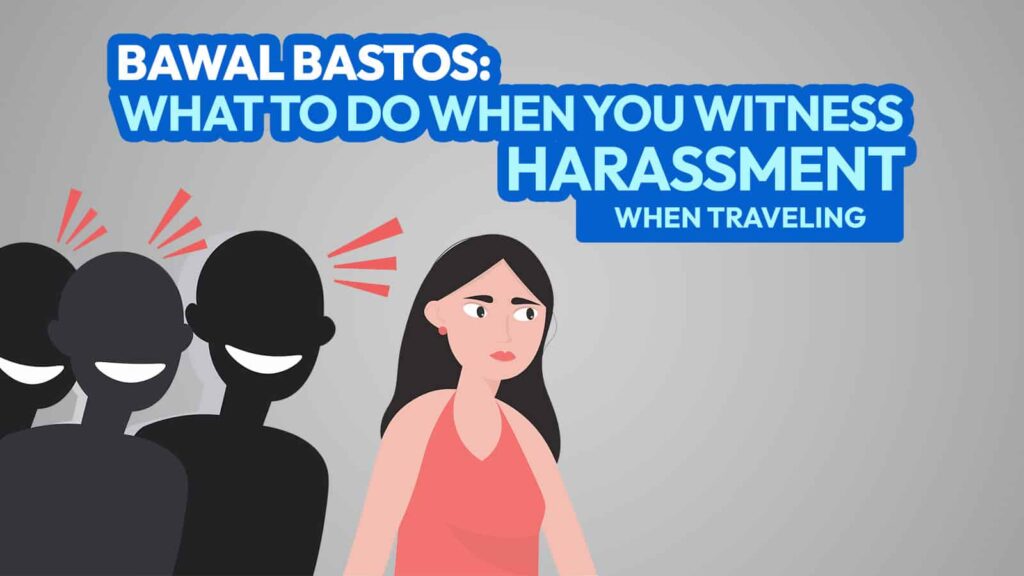
Lunas Collective, volunteer-powered chat helpline, recently held an event called #DearSurvivor, an online discussion on gender-based violence experienced in public and online spaces. This online service has been helping people who experienced gender-based violence.
Gender-based violence refers to harmful acts experienced by anyone because of their gender identity or sexuality. During #DearSurvivor, speakers tackled this extensively — what it is, what actions we can take, and how we can care for the survivors. In this post, I’ll share with you some of the things I learned from the event that may be good to know to help make safe spaces for ourselves and for people around us when we travel — whether it’s during your daily commute or a vacation.
But first, let’s talk about the Safe Spaces Act!
Safe Spaces Act also known as Republic Act 11313 is a law in the Philippines that provides protective measures and prescribe penalties for gender-based violence or harassment. Violation of the Safe Spaces Act is a criminal offense and is punishable with fines or imprisonment.
This applies in public spaces such as streets, restaurants, hotels, malls, public parks, public utility vehicles, governments offices, workplaces, schools, etc. This is also applicable to online platforms.
According to Lunas panelist and Ateneo Law faculty member Atty. Patty Sta. Maria, the acts that are punishable under this law include both verbal and physical acts such as, but are not limited to the following:
- Catcalling
- Misogynistic, transphobic, homophobic, and sexist slurs
- Relentless requests for personal details
- Uninvited comments about appearance
- Sexual or lewd suggestions
- Obscene gestures
- Groping
- Unwanted Advances
- Any conduct of sexual nature and other conduct based on sex that affects the dignity of a person, which is unwelcome, unreasonable, and offensive to the recipient.
- Creates an intimidating, hostile, or humiliating environment for the recipient.
This includes communication through electronic means.
If you witness someone being victimized of a gender-based violence, there are things you can do as a bystander. Often, people don’t take action due to multiple reasons including what is called the bystander effect.
Bystander effect is when you don’t do anything because nobody else is doing anything either or you’re assuming that someone else is already doing something about it. Other reasons could be a cultural thing, thinking that’s just the way it is or thinking why make it your problem when you’re not being bothered. Or it could also be thinking that helping won’t really help anyway.
During the #DearSurvivor session, panelist and physical therapist Barb Nava discussed the 5Ds of Bystander Intervention, as put together by ihollaback.org, a worldwide people-powered movement to end all forms of harassment. Make yourself familiar with this and remember it in case you witness gender-based violence in public spaces.
- Distract. You can do this by striking up a conversation with the target or find another way to draw the attention away from them. Some things you can do is ask for directions or time.
- Direct. Before you do this, make sure to asses your safety first. You can call out or speak up about the harassment and be firm about it. Then, talk to the person being harassed.
- Delegate. You can find help from someone else, especially someone of authority. For example, if you’re on a bus, you may call the attention of the conductor or the driver. After you do this, you can check on the person being harassed and ask them if they want to call the police.
- Delay. After the incident is over, check on the person being harassed. Ask if they are okay, if they want company, or if they want to be accompanied somewhere.
- Document. Again, ensure your safety first before doing this and try to do the first 4Ds to help the victim first. If you’ve done that and the harassment hasn’t stopped, record a video or an audio of what’s going on. This would be very helpful if the victim decides to report the incident to the police. If you do this, here are a few things to remember:
– Keep a safe distance.
– Film street signs and/or other landmarks to help identify the location.
– Say the date and time audibly on the recording.
When the incident is over, ask the person targeted what they want to do with the footage. Never post it online without their permission.
Make sure that whatever you do is focused in supporting them. And when the survivor is ready, encourage then to reach out and report the incident. Here are a few ways you can report gender-based violence:
- Aleng Pulis (PNP)
PNP Women Child Protection Center Hotline: 177 / 8532-6690
Aleng Pulis Hotline: 09197777377 - Tisya Hustisya (Free Legal Advice Support)
fb.com/tisyahustisya
Globe/TM: 09533826936
Smart/TNT/Sun: 09510774412
During the panel discussion, road safety advocate Arlet Villanueva also shared safety tips when traveling, especially if you’re solo.
- Know your location. Familiarize yourself with the place you’re visiting. Know your routes and plan your stops. It is also important to know your way around the area you will be staying in.
- Use an app to share your location to family and friends. There are many apps you can use that will allow your family and friends to know your location even if you are away from them. Use this so someone would always know where you are.
- Bring a whistle. When you travel alone, bring a whistle and keep it with you at all times. You may use this to get attention or call for help in case something bad happens.
- Don’t be afraid to speak up when you feel uncomfortable. Your safety is the most important so don’t be afraid to say when something is making you uncomfortable.
For more information about LUNAS COLLECTIVE, check out their Facebook page!
2022 • 01 • 13

